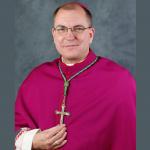From the SSPX website:
In an interview with an independent French television station, Bishop Fellay commented on the current status of relations between Rome and the SSPX.
During a 20 minute interview with TV Libertés on January 29, 2017, Bishop Bernard Fellay, Superior General of the Society of St. Pius X (SSPX), commented on the crisis of the Church after the Second Vatican Council, the reaction of the clergy to today’s confusion, the Rosary Crusade, and Pope Francis.
Bishop Fellay commented also on the Personal Prelature offered to the SSPX:
“I think we do not have to wait for everything to be resolved in the Church, for all the problems to be solved. But a certain number of conditions are necessary, and for us the essential condition is our survival. So I have told Rome, very clearly, that, just as Archbishop [Marcel] Lefebvre used to say in his day, we have a sine qua non condition: if this condition is not met, then we will not move. And this condition is for us to be able to remain as we are, to keep all the principles that have kept us alive, that have kept us Catholic….I think we are making headway here in the right direction. Rome is easing up. It is pretty recent; over the past two years now let’s say, Rome has been telling us that there are questions, or we can even say statements, put forward by the Council that are not required criteria for being Catholic. That means that we have the right not to agree and still be considered Catholic. And these questions are precisely the ones we dispute.”
Archbishop Guido Pozzo, Secretary of the Ecclesia Dei Commission, confirmed the words of Bishop Fellay, according to Andrea Tornielli in Vatican Insider on January 30, 2017. “We are working at this moment on the completion of some aspects of the canonical solution, which will be the Personal Prelature.”
In particular, Archbishop Pozzo confirmed an important piece of information made public by Bishop Fellay in the interview with TVLibertés:
The Holy See allows and tolerates the priestly ordinations of the Society of St. Pius X while continuing to consider them valid but not licit, after they disclose the names of the ordinands to the local bishop.”
Read more. And stay tuned.
Regarding a “personal prelature”:
Personal prelature is a canonical structure of the Roman Catholic Church which comprises a prelate, clergy and laity who undertake specific pastoral activities. The first, and thus far the only, personal prelature is Opus Dei. Personal prelatures, similar to dioceses and military ordinariates, are under the governance of the Vatican’s Congregation for Bishops. These three types of ecclesiastical structures are composed of lay people served by their ownsecular clergy and prelate. Unlike dioceses which cover territories, personal prelatures—like military ordinariates—take charge of persons as regards some objectives regardless of where they live.
In the Roman Catholic Church, the personal prelature was conceived during the sessions of the Second Vatican Council in no. 10 of the decree Presbyterorum ordinis and was later enacted into law by Paul VI in his motu proprio Ecclesiae sanctae. The institution was later reaffirmed in the 1983 Code of Canon Law.












